By Amir Bahram Arab Ahmadi

French Colonial endeavor in West Africa began in 1637 when various generals and wealthy French men started exploring the continent.
General Louis Faidherbe, who ended up becoming the colonial administrator of Senegal, was the first French official to recognize the riches and resources of West Africa, making the region known as a potentially profitable colony.
“Our possession in the West Coast is possibly one of all our colonies that has before it the great future and deserves the whole sympathy and attention of the empire,” he wrote to the colonial office while dreaming of creating a French African empire stretching from Senegal to the Red Sea.
Though France's colonial presence in Africa dates back to the 16th century, it was in the 19th and 20th centuries that France became a major colonial power, second only to Britain. The French colonial empire encompassed vast territories in northern, central, and western Africa, comprising 18 modern-day African countries. However, France's colonial policies were primarily driven by the desire to exploit Africa's abundant mineral resources for economic gain. This led to the ruthless plundering of these resources and the exploitation of African labor, with France deploying its troops to ensure the continuation of its exploitative practices.
Throughout centuries of colonial rule, numerous massacres occurred whenever movements seeking independence emerged. French leaders resorted to brutal and inhumane methods to suppress these movements, resulting in widespread suppression and killings in countries such as Senegal, Mali, Chad, Niger, and Algeria. Moreover, slavery became a lucrative business for France, with generations of Africans trafficked to France and other parts of the world as a result of French slave policies.
As the threat to French colonial rule grew, France attempted to train a generation of African intellectuals who would be dependent on France and serve its interests once their countries gained independence. France also bolstered its military presence in Africa to safeguard its colonial interests, a practice that continues to this day under the pretext of fighting terrorism.
In the post-colonial era, France has predominantly focused on maintaining economic and cultural control over its former colonies. French corporations continue to exploit and profit from African resources, while France supports dictators who align with its interests. Additionally, France utilizes cultural institutions and media outlets to preserve its influence in Africa, with organizations like the Organisation Internationale de la Francophonie operating under the guidance of the French government. This approach has been labeled as a form of modern or invisible colonialism.
In recent decades, there has been a growing expression of anger and resentment among French-speaking African people towards French colonial policies. African intellectuals have actively worked towards challenging and dismantling the long-lasting effects of French colonialism. However, achieving complete independence from France will require time and strategic efforts due to Africa's economic ties and dependence on France, as well as the use of the CFA franc.
Similar to other colonial empires such as the UK with its sterling zone or Portugal with its escudo zone, France came up with franc zone. The creation of the CFA franc, originally known as the French African Colonial franc, was officially declared on December 26, 1945, by General de Gaulle.
Despite its long existence, the CFA franc enjoys tepid to no support among the African population. It is believed that countries using the CFA franc lack monetary independence as France holds immense control over the monetary and fiscal policies of these nations.
Membership in the franc zone is believed to also hinder the progress of democracy. It is argued that France has never hesitated to remove heads of state who show intentions of withdrawing from the system. Many leaders were either ousted from power or killed in favor of more compliant individuals who would hold onto power at any cost, as exemplified by the CAEMC nations and Togo. In such circumstances, economic development becomes impossible, and the creation of a political system that addresses the concerns of the majority of citizens is also made extremely difficult.
Despite multiple coups happening in West Africa, no country in the region has yet successfully scrapped the African Franc and proceeded to use a currency of its own. France holds a tight grip over these countries’ economies for now, but it should keep in mind that Africa will eventually try to demolish any ghosts of the French colonization that is still haunting the continent.
Furthermore, the increasing presence of China, Russia, India, and Turkey in the region has posed a threat to French interests in Africa, which could also be deemed responsible for the overthrow of French-backed governments in various African countries. This trend may continue to spread to other former French colonies.
In conclusion, the struggle for independence from French colonialism and the shifting geopolitical dynamics in Africa are ongoing processes that will demand time, perseverance, and strategic efforts from African nations. The journey towards reclaiming true African identity will be gradual, encompassing political, economic, cultural, and linguistic dimensions.

No comments:
Post a Comment